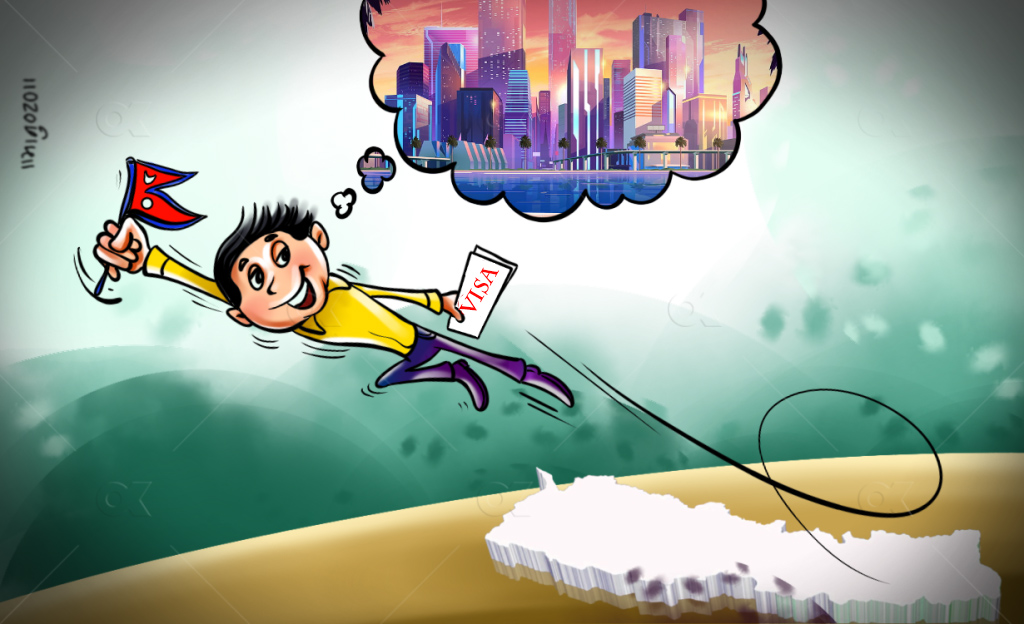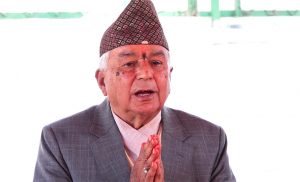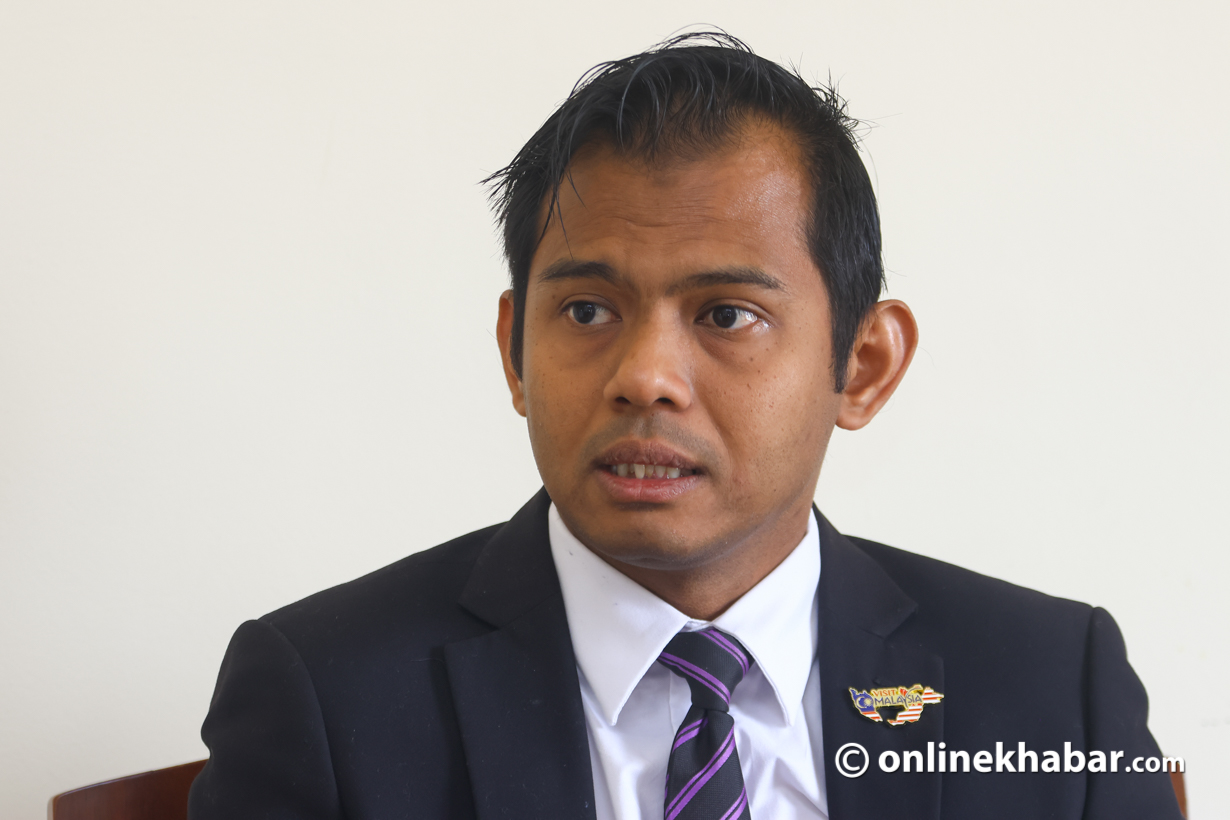Even after crossing 11 countries and spending million rupees, struggle does not end

Nineteen-year-old Manish from Chitwan was not interested in his studies, he had a bigger dream. He decided to drop out of school, go abroad and earn a fortune.
He tried to go to Israel, but was denied a visa. Then it was Europe, the land of affluence and plenty.
Within a few months, Manish was throwing a party for his friends. He had received a visa to go to Europe. Bharat, another 19-year-old with similar aspirations was also going to travel with him. The duo spent more than Rs 200,000 ($2,000) on their celebrations and shopping.
“We were to arrive in Estonia where lucrative jobs would be waiting for us,” Manish shares as he remembers the exact lines Rajendra Adhikari and Thakit Adhikari, the ‘consultants’ who had found them their new jobs. Excited to be going to Europe, Manish and Bharat paid Rs 300,000 ($3,000) each to the Adhikaris before they received their tourist visas to Russia.
The Adhikaris had told them that they had good connections in India and they could easily fly to Moscow if they showed the officials at the Delhi Airport that they had $ 800 to spend in Moscow. That was what happened.
When the plane from Delhi landed in Moscow, an Indian came to the airport to receive the Nepali boys. “He asked us how much money were carrying,” remembers Manish. “Bharat gave the man his purse, but I told him I only had $200, and managed to keep the $600 with me.”
It was only when one of the middlemen told them that their journey to Europe would have to be made illegally that the reality dawned on the two fresh arrivals from Kathmandu. “The agents told us that the Russian guides would take them to a Latvian hotel, where people would come to receive us for the journey to Finland.”
On the eighth day, two Russians came to fetch them on a taxi. Before starting the journey, the cabbie ordered all the occupants (two Nepalis and an Indian) to switch off their mobile phones and to hand them over to him. Manish had a new iPhone 5 while the two had cheap sets.
“The driver then took us to a dense forest. Everyone except me, were given their mobile phones back,” he shared.
“Now, we were very clear that the path ahead was challenging, and our lives were at stake. We had nothing to eat or drink in that dense forest.”

The driver robbed the trio of the money and food they had.
“Now, we were very clear that the path ahead was challenging, and our lives were at stake. We had nothing to eat or drink in that dense forest.”
They were soon approached by a Russian ‘guide’, apparently in the drunken stupor. None of them could understand his language, yet they did not have any option than to follow him.
Nothing to eat, nothing to drink, they were forced to share a can of energy drink that Manish had hidden in his bag, but that increased their thirst for water.
Having kept some of the clothes in his backpack, he decided to ditch the luggage. “When I was throwing the bag, I could sense that I was throwing away my Europen dream.”
Manish had a suitcase from he brought from Nepal on which had new clothes worth over Rs 50,000. “I had no option but to ditch the bag, I could not carry it anymore.”
Having kept some of the clothes in his backpack, he decided to ditch the luggage. “When I was throwing the bag, I could sense that I was throwing away my Europen dream.”
The guide would signal them to hide under bush whenever they heard a noise. As they lay under the bushes, they became food for mosquitos. One day, they heard a car pass by. They hid under the bush and after minutes, they stood up again to find that the guide was not there!
The road ahead was was muddy. Bharat slipped and fell into a ditch, but fortunately was saved by his mates. On the way, they would lie low and sip mud to quench their thirst. Not only did it satisfy their thirst, it choked them.
Meanwhile, they learned that they already crossed the Russian border and entered Latvia.

On a fine morning, they saw a village and a tarmacked road in front of them. Exhausted after the long walk, they decided to take a break. They fell asleep. But when woke up, they found out that they were sleeping at a cemetery.
It was only a matter of time before police caught them and handed them over to the immigration officials. The officials gave them five litres of water and quizzed them.
The trio had lied to the interpreters about their identity. They were taken to a detention camp. “To our surprise, we found many other Nepalis there.”
“Then, I wanted to return home.”
The detainees reestablished contact with family members and the middlemen from the camp.

Meanwhile, the Adhikaris bargained with the parents of the victims claiming their sons had been imprisoned and they needed money for their release. The release was not that easy. They had already torn their passports in Russia and had lied to the officials about who they were.
The officials sought their passports for the release, which they did not have.
They decided to file applications for deportation and provide true information now. Manish contacted the middlemen and asked to help him get the citizenship certificate from home. They agreed and sent the certificate, by defrauding the parents of Rs 400,000 again.
Consequently, Manish received his deportation letter. The court ordered the release of the three people on a single day.
One of the agents, Rajendra Adhikari assured Manish that they would reach Estonia on a taxi after around eight hours. He said a Bangladeshi man will receive them in Estonia and take them to Finland.
“We would have to use the Bangladeshi’s papers and board a ship to Finland, one at a time,” says Manish. “The Bangladeshi managed to get us to a bus station in Finland.”
“We also came across a Nepali restaurant. We hoped that the owners would shelter us, but to no avail.”
The four travelled by bus, taxi and train to reach Hamburg from Finland in 48 hours. On the way, they survived just on just coffee as they did not have money to afford any food. They found a Pakistani man, who provided them shelter and food for a day.
“We also came across a Nepali restaurant. We hoped that the owners would shelter us, but to no avail.”
Restless, the four contacted their agent in India, but he could not help either.
“We applied for refugee status with a hope to receive an allowance and make a living in Germany. But, we were again detained for 17 days. I contracted chickenpox.”

They concluded that they could be imprisoned if they stayed longer in Germany. After four months, in consultation with a Nepali in Germany, they sought a way to get to Spain after learning that authorities there do not deport illegal immigrants.
They asked their family back home to send some money for the journey to Spain.
While one of them left for Portugal, Manish reached Barcelona. He’d crossed 11 countries, and spent over Rs 1.7 million to do that.
Currently, here are around half dozen Nepali youths like Manish in Barcelona. There are many other Nepalis in Europe, who risked their lives to get here.
While Spain and Portugal have comparatively flexible immigration policies, other European nations are very tough in their treatment of illegal immigrants. Therefore, these two nations have become hubs for many Nepalis travelling illegally.
Stricter provisions are being adopted for work permit in Spain and Portugal. One has to live at least three years in the country to get the permit in Spain. In these three years, migrants have to work illegally for meager payments. The legalisation process itself costs around Rs 1 million.
“This is the reality of the costly European dream,” Manish says as he counts his blessings.
Translated version of a story by Onlinekhabr’s Europe Coordinator Basanta Ranabhat. Names changed upon request. Pictures only for representative purpose.


